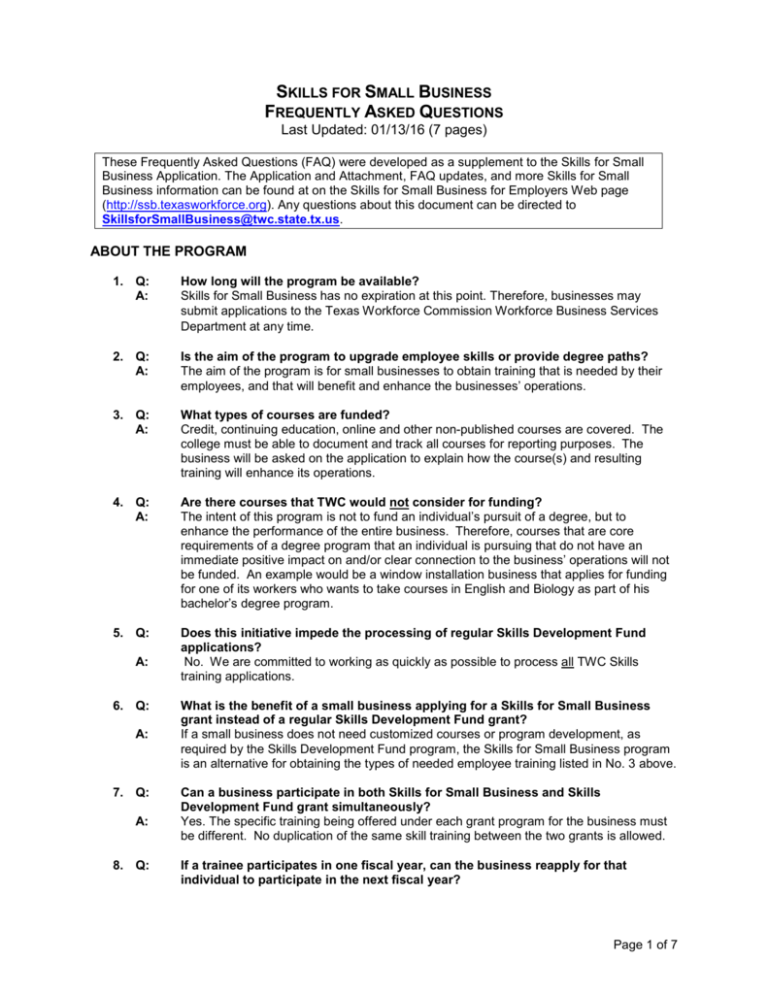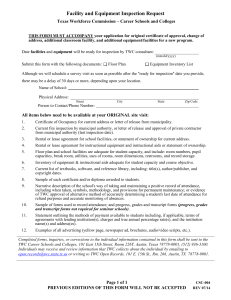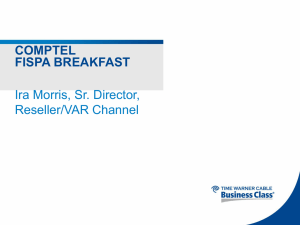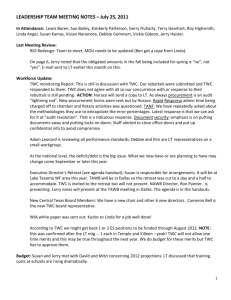Skills for Small Business FAQ
advertisement

SKILLS FOR SMALL BUSINESS FREQUENTLY ASKED QUESTIONS Last Updated: 01/13/16 (7 pages) These Frequently Asked Questions (FAQ) were developed as a supplement to the Skills for Small Business Application. The Application and Attachment, FAQ updates, and more Skills for Small Business information can be found at on the Skills for Small Business for Employers Web page (http://ssb.texasworkforce.org). Any questions about this document can be directed to SkillsforSmallBusiness@twc.state.tx.us. ABOUT THE PROGRAM 1. Q: A: How long will the program be available? Skills for Small Business has no expiration at this point. Therefore, businesses may submit applications to the Texas Workforce Commission Workforce Business Services Department at any time. 2. Q: A: Is the aim of the program to upgrade employee skills or provide degree paths? The aim of the program is for small businesses to obtain training that is needed by their employees, and that will benefit and enhance the businesses’ operations. 3. Q: A: What types of courses are funded? Credit, continuing education, online and other non-published courses are covered. The college must be able to document and track all courses for reporting purposes. The business will be asked on the application to explain how the course(s) and resulting training will enhance its operations. 4. Q: A: Are there courses that TWC would not consider for funding? The intent of this program is not to fund an individual’s pursuit of a degree, but to enhance the performance of the entire business. Therefore, courses that are core requirements of a degree program that an individual is pursuing that do not have an immediate positive impact on and/or clear connection to the business’ operations will not be funded. An example would be a window installation business that applies for funding for one of its workers who wants to take courses in English and Biology as part of his bachelor’s degree program. 5. Q: Does this initiative impede the processing of regular Skills Development Fund applications? No. We are committed to working as quickly as possible to process all TWC Skills training applications. A: 6. Q: A: 7. Q: A: 8. Q: What is the benefit of a small business applying for a Skills for Small Business grant instead of a regular Skills Development Fund grant? If a small business does not need customized courses or program development, as required by the Skills Development Fund program, the Skills for Small Business program is an alternative for obtaining the types of needed employee training listed in No. 3 above. Can a business participate in both Skills for Small Business and Skills Development Fund grant simultaneously? Yes. The specific training being offered under each grant program for the business must be different. No duplication of the same skill training between the two grants is allowed. If a trainee participates in one fiscal year, can the business reapply for that individual to participate in the next fiscal year? Page 1 of 7 A: Training is not based on a fiscal year, but rather on a 12-month period. The program pays up to $1,800 for each new employee being trained and $900 for existing employees per 12- month period. 9. Q: Does this program restrict a business from leveraging the funding from a Skills for Small Business grant with other grants or funding sources, such as Texas Public Education Grants (TPEG) and Pell Grants? No. A: 10. Q: A: Who are the grant applicant and administrator for these grants? The small business completes the application, which identifies the training needs and requested course(s), and submits it directly to TWC. TWC evaluates the application and contracts with the local college to fund the selected course(s). The college will provide the training and administer the grant. 11. Q: If a trainee lives in one college district and works in another, how is enrollment eligibility determined? If the class is a continuing education (CE) course, then it does not matter. In most cases, the eligible college will be determined based on the location of the business. However, if the requested training is for a credit course, you may contact the selected college to determine if there are in-district and out-of-district issues that apply. A: 12. Q: A: Do businesses pay the college for the training and be reimbursed by TWC? No. The college receives funding through a grant from TWC for the approved training. In some cases, the grant funding covers all tuition and fees, and in others it covers only a portion of those costs. The business is responsible for any costs not covered by the grant. BUSINESS QUESTIONS 13. Q: A: Is the business required to pay participating employee(s) prevailing wage when training starts or by the completion of the training course(s)? The prevailing wage is a statutory requirement and must be paid to employees at the time the application is submitted. As part of the review process, TWC will determine if the wages identified in the application meet this requirement. 14. Q. A: Is the business required to provide benefits for participating employee(s)? No. However, businesses must comply with the Fair Labor Standards Act (FLSA), 29 U.S.C. Chapter 8. (If employees are required by the business to attend the identified courses outside of standard work hours, the business must ensure appropriate compensation, in compliance with the FLSA.) 15. Q: Must participating businesses provide matching funds or make an in-kind contribution? No. A: 16. Q: A: Is the business responsible for collecting Social Security numbers (SSN), and wage and hire date information, and providing it to the college? No. Once a business’ application is determined to be fundable, it will be required to provide information to TWC on each participating employee, including: Employee’s full name, middle initial (if applicable), and last name Employee’s Social Security number* Employee’s mailing address Employee’s birth date Employee’s veteran status (Yes or No) Page 2 of 7 Employee’s hire date TWC will provide the college this information to track and report to TWC on the employee’s progress throughout training. It must be received by TWC before final approval of the application and release of funds to the college. *IMPORTANT: There is no alternative to the use of a SSN as the identifier of individual employees participating in the Skills for Small Business program. Employees who do not allow the release of this information to TWC will not be able to participate in the program. 17. Q: A: 18. Q: A: 19. Q: A: Is there a minimum or maximum number of employees that a business must have participating in training? No. A business may have any or all of its employees participate in training. Since a small business is defined as one that employs at least one individual and not more than 99 individuals companywide, the minimum number of employees is one and the maximum number is 99. Self-employed individuals are not eligible to participate in the Skills for Small Business program. Can a new employee take more than one course in a 12-month period if the total cost of those courses does not exceed the $1,800 limit covered under this program? Yes, the program will cover up to $1,800 of tuition and fees costs in a 12-month period for a new employee. Are only full-time employees eligible training participants or will part-time employees be able to participate as well? Only full-time, permanent employees may participate in the program. 20. Q: A: Is there someone available to help a business fill out the application form? There are several options for businesses to receive assistance. TWC’s Workforce Business Services Project Development Team is available and can be reached at (877) 463-1777 or by e-mail at SkillsforSmallBusiness@twc.state.tx.us. TWC also encourages businesses to seek assistance from the local college, workforce board representative or Small Business Development Center (SBDC). 21. Q: A: What types of businesses would not be eligible to participate in this program? Private non-profits, community-based organizations, publicly funded entities and other public non-profits are not considered private businesses and would not be eligible for this program. The only exception is that a private non-profit hospital would be eligible to participate. Additionally, child care centers and similar entities would not be eligible for SSB funding because other funding resources have been made available that directly target this industry. In recent years, the State of Texas has made significant investments of approximately $50 million directed at the child-care industry to support child care quality improvement, which includes training. In addition, the state has dedicated child-care funding to support child-care training through: The Children’s Learning Institute, which annually receives $11.7 million to support training and professional development as a component of the Texas School Ready (TSR) Project. The Texas Education Agency, which annually receives $1 million to fund the management of early childhood education partnerships projects, including the award of stipends, to facilitate increased participation in professional development by early childhood education professionals and encourage those professionals to seek additional education. Page 3 of 7 22. Q: A: What if a business requests a training course the college does not offer? Businesses must use the active college catalogs and course schedules to select requested training. 23. Q: What is the deadline for submitting an application for training under Skills for Small Business? The Skills for Small Business program has no set deadline for application submission. However, it is recommended that applications are submitted at least two weeks prior to the requested training. This will provide enough time for application processing and working with the local community college to enroll employees in selected training. A: 24. Q: A: 25. Q: A: Will the Local Workforce Development Board be made aware of a business’ Skills for Small Business award? When a project is approved by TWC, the Board will be copied on the e-mail notification to the business and college. Is the business required to list job postings in Work in Texas? It is not a requirement, but we encourage businesses to take advantage of this service. FUNDING QUESTIONS 26. Q: A: Are third-party training vendors allowed to participate in this initiative? No. The program will only cover course offerings provided by public community and technical colleges in the local area. It will not cover costs for course offerings from thirdparty vendors, universities, or proprietary or vocational schools. 27. Q: Will specialized courses be allowable, such as language acquisition, soft skills, OSHA and other safety training? Requests for such training will be considered as long as the courses are offered by the college. The business must provide adequate justification in the application for why the training is needed and how it will benefit the business’ operations. A: 28. Q: A: If a business requests a course that the college offers but is not in the catalog, will it be considered for funding? Yes. Some colleges offer certain courses that may be of interest to local businesses, but that are not published in the course schedules. If a business knows about these courses, it can work with the college to schedule the course. 29. Q: A: Will a customized training course that is not listed in a catalog be funded? Yes, as long as the course originated from a prior customized Skills training program and is now considered a regular open enrollment course offering. However, if the business is requesting new courses that must be customized, then the business should work with the college to develop a regular Skills Development Fund project. 30. Q: A: What is the reimbursement rate, and what does it cover? Training for an employee hired within the twelve months prior to the submission of the application is considered a new hire, and the program will cover course tuition and fees costs up to $1,800 within a 12-month period. For an incumbent employee, the program will cover course tuition and fees costs up to $900 in a 12-month period. The program covers only those course tuition and fees as listed in the college catalog, including lab and computer fees. There is no minimum or maximum number of required contact hours, or required rate per hour. 31. Q: What will not be funded under this program? Page 4 of 7 A: 32. Q: A: 33. Q: A: Books, course materials and supplies, testing and certification fees, and costs associated with registration for credit courses are examples of costs that will not be funded through this program. Also, any course tuition and fees that exceed the amount allowable within a 12-month period must be paid for by the business or other funding source. Will this program pay for courses that last more than 12 months, including pre -requisite courses? The application should only include tuition and fees for courses that can be completed within a 12-month period. However, a second application for an additional 12-month period may be submitted for consideration once the initial 12-month period has elapsed. If a business wants a new employee to take a course that requires a pre-requisite, who will be responsible for paying the difference if the combined cost of the courses is over $1,800? The business is ultimately responsible for costs that exceed the $1,800 cap; however, it may leverage other funding sources to cover those costs. COLLEGE QUESTIONS 34. Q: A: What happens when administrative monies go to a department other than Continuing Education or contract training? Administrative funds are intended to cover the costs incurred by the college to administer the grant, including program and financial reporting. Contract language states that grant funds shall only be expended for the costs incurred for authorized activities or performances rendered. TWC encourages all colleges to keep accurate records to document costs incurred in performing these functions. 35. Q: A: How does the contracting process work with the colleges? Shell contracts are established with colleges, as requested. Contracts are set up to allow for updates and quarterly amendments during the term of the contract to add approved businesses and training. Contracts have a minimum amount of $20,000 or the total cost of the approved training, whichever is higher. 36. Q: A: When will the colleges know a business is requesting training? Unless the business has talked with college staff in advance, the college will not know about the requested training until after the application has been submitted. Once TWC has reviewed and determined that an application is fundable, it will coordinate with the college to ensure that there are no issues with the requested training. 37. Q: Is it possible for the college to group employees according to start time for reporting purposes, so that they can be treated as a cohort despite the variety of courses in which their employees are enrolled and for the number of different companies that are participating? The Skills for Small Business program is intended to meet the immediate training needs of small businesses at times and in locations that are convenient to the business. The college can set up a reporting structure that is convenient for them, as long as it meets TWC reporting requirements and does not adversely affect the business’ participation. A: 38. Q: A: How will colleges work together when a requested course is not offered at the college in the area where the business is located, but at a neighboring college? Many neighboring colleges have established regional agreements to address service area issues so that a business’ training needs are prioritized. In the event no such agreement is in place, TWC will work with the business and the colleges to achieve a viable solution. Page 5 of 7 39. Q: A: How will the reporting be handled? Will it be uploaded into the Learner Outcome Tracking System (LOTS)? How will contracts be amended and TIFs maintained? Colleges will report to TWC using the same procedures as with regular Skills Development Funds grants. They will upload trainee data into LOTS using the Trainee Information Form (TIF). The only difference will be that TWC will obtain the following data elements from the business and populate the TIF for the college: Employee’s full name, middle initial (if applicable) and last name Employee’s Social Security Number* Employee’s mailing address Employee’s birth date Employee’s veteran status (Yes or No) Employee’s hire date When training for a new business is approved, TWC will notify the college of the “update” to the contract, including the business, occupations for training, and courses to be provided. Each quarter, the contract will be formerly amended to include all of the updates that were made in the previous three months. *IMPORTANT: There is no alternative to the use of a SSN as the identifier of individual employees participating in the Skills for Small Business program. Employees who do not allow the release of this information to TWC will not be able to participate in the program. TWC staff, Local Workforce Development Board staff, and TWC grantees must ensure the security of personally identifiable and other sensitive information, and maintain such information in accordance with TWC standards and security measures. TW C W D Letter 13-08 (http://www.twc.state.tx.us/boards/wdletters/letters/13-08.pdf) issued April 1, 2008, and TWC WD Letter 13-13 (http://www.twc.state.tx.us/boards/wdletters/letters/13-13.pdf) issued April 2, 2013, provide information on security measures that must be implemented to ensure the confidentiality and security of customers’ personal identity data. TW C uses a computer system called Learner Outcome Tracking System (LOTS) to track contractor’s performance against grant awards from the Skills Development and Self Sufficiency Fund, and Skills for Small Business programs. TW C uses a multi-level approach to address system and data security. LOTS user access is granted by TW C through a user security system. A self-registration process is used to provide access to a specifically identified contact. Once this contact is established as the initial user, he/she can authorize additional individuals to register with LOTS for the same grant recipient. Grant recipients can only view data they have loaded into LOTS for the grant awarded. Data uploads are accomplished through a LOTS website that uses secure socket layer (SSL) security, which encrypts or scrambles all of the data between the web server and the user’s internet browser. It is the same type of security that banks and secure online shopping websites provide to protect your credit card data over the Internet. 40. Q: A: 41. Q: What if a trainee does not complete the course either by not going to class or by dropping out? The college is responsible for trainee tracking and reporting, including attendance confirmation and contact hours completed. The college will not be held responsible for performance if a trainee does not complete a course. The application requires the business to sign assurances that trainees will attend classes and complete the training. Although the business will not be penalized if enrolled trainees fail to attend class or drop out, it could impact approval of any future training requests. What if an employee separates from the business? Page 6 of 7 A: 42. Q: A: The 90-day retention requirement that is in regular Skills Development Fund contracts has been waived for the Skills for Small Business program. If an individual is approved for training while employed by “Business A,” but then goes to work for “Business B” while in the middle of the course, will the individual be allowed to complete the course? Yes. MARKETING QUESTIONS 43. Q: A: How are the Local Workforce Development Boards (Boards) involved? The Boards are an important part of this initiative. They are involved in marketing the program, convening businesses and participating in the Governor’s Small Business Forums. They also can identify locally targeted occupations and assist businesses with the application process. 44. Q: A: How is the program be marketed to the small businesses of Texas? Marketing efforts to promote the Skills for Small Business program include press releases, brochures, a dedicated TWC Skills for Small Business Web site (http://ssb.texasworkforce.org) and participation in the Governor’s Small Business Forums. Program brochures and information are available through the TWC Workforce Business Services Project Development Team, Local Workforce Development Boards, public community and technical colleges, economic development entities and Small Business Development Centers. TWC encourages community colleges to attend the Governor’s Small Business Forums to promote courses and provide a contact for future project development. 45. Q: A: Can colleges receive a list of small businesses to recruit? Yes. The TWC Workforce Business Services Project Development Team can provide colleges with local small business data. You may contact us at (877) 463-1777 or by email at SkillsforSmallBusiness@twc.state.tx.us. 46. Q: Will colleges be provided documentation regarding this initiative to distribute to the appropriate departments within their institution’s college? Yes. The Skills for Small Business application and additional information are currently posted on the TWC Skills for Small Business Web site (http://ssb.texasworkforce.org). If additional information is needed, you may contact us at (877) 463-1777 or by e-mail at SkillsforSmallBusiness@twc.state.tx.us. A: Page 7 of 7





